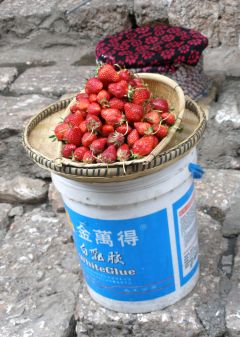May 25, 2007
Vitamins Too

NPR provided a jarring wake up call this morning by broadcasting some more disturbing news about Chinese food and drug imports
China has become the leading supplier of many food ingredients, such as apple juice, a primary sweetener in many foods; garlic and garlic powder, a major flavor agent; sausage casings and cocoa butter.China now supplies 80 percent of the world's ascorbic acid — vitamin C. It's used as a preservative and nutritional enriching agent in thousands of foods. One-third of the world's vitamin A now comes from China, along with much of the supply of vitamin B-12 and many health-food supplements, such as the amino acid lysine.
That is no accident. Chinese manufacturers have tried to corner the market in many food ingredients by under-pricing other suppliers.
Leo Hepner, a food-ingredient consultant based in London, says vitamin C is a good example.
"The price in 1995 was $15 per kilogram," Hepner says. "Today, the price from China is $3.50."
No one can compete with that. So most Western producers of vitamin C have shut down.
That's globalization. But there's a hidden price for cheap goods. Earlier this year, lead-contaminated multivitamins showed up on the shelves of U.S. retailers. And this spring, vitamin A from China contaminated with dangerous bacteria nearly ended up in European baby food.
If you go to the article, you can see that China is also producing cheap antibiotics Erythromycin, Amxicillin and Oxytetracycline.
Here's a list of Chinese imports that were refused by the FDA in April 2007 alone. According to William Hubbard, former deputy commissioner of the FDA, who now works with the Coalition for a Stronger FDA:
"The system is so understaffed now that what is being caught and stopped is only a fraction of the food that's actually slipping through the net," he says.The FDA normally inspects about 1 percent of all food and food ingredients at U.S. borders. It does tests on about half of 1 percent.
And official vigilance has been going down — for two reasons.
First, food imports have increased dramatically, from $45 billion in 2003 to $64 billion three years later.
Second, the "food" part of the FDA has been getting smaller.
Shaun Kennedy of the National Center for Food Protection and Defense says no country is increasing its food exports faster than China.
Gives us a little something to consider as we pop our vitamins this morning.
Photo note: Fresh strawberries resting on a bucket of white glue taken on location in Lijaing, China. We did not partake, in spite of their succulence.
Posted by Dakota at May 25, 2007 08:31 AM